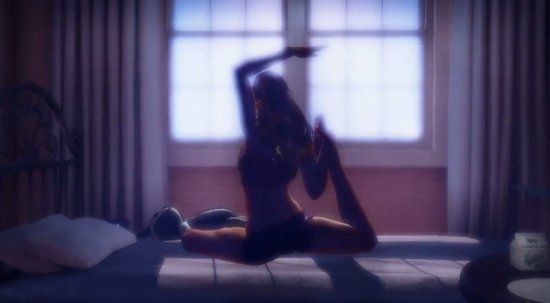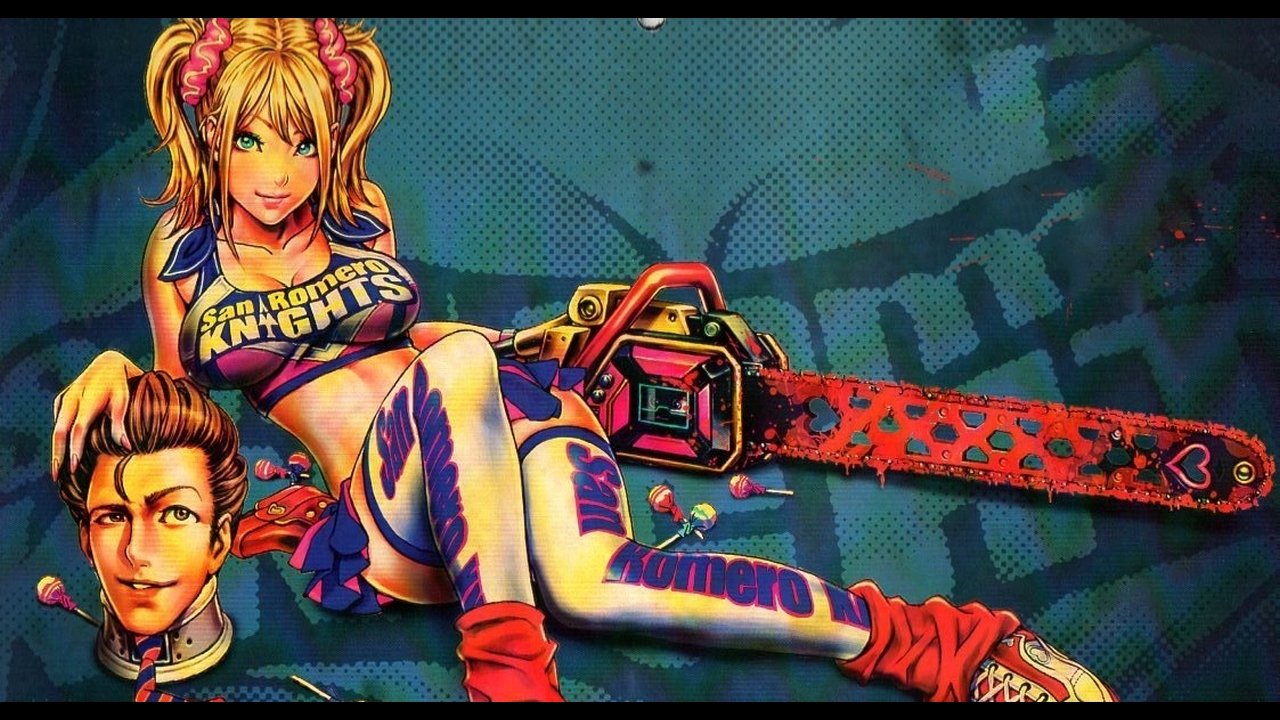Lollipop Chainsaw will probably vanish from the videogame conversation very soon.
Its relatively shallow combat system, hit-and-miss humour and fairly forgettable end impression pretty much guarantee that the best legacy the game can hope for is as a cult curio of the current console generation. That’s a bit of a shame because, despite its many faults, Lollipop Chainsaw prompts a conversation about videogame sexuality that more people might benefit from engaging with.
 The game’s introductory cutscene scrolls lasciviously over the body of a teenage girl (conveniently, on the morning of her 18th birthday) while she practices yoga, showers and supplies a monologue that introduces the game’s Buffy-esque plot. Right from the opening frames, Lollipop Chainsaw invites players to view Juliet Starling, its protagonist, as an object rather than a robust character.
The game’s introductory cutscene scrolls lasciviously over the body of a teenage girl (conveniently, on the morning of her 18th birthday) while she practices yoga, showers and supplies a monologue that introduces the game’s Buffy-esque plot. Right from the opening frames, Lollipop Chainsaw invites players to view Juliet Starling, its protagonist, as an object rather than a robust character.
Sounds pretty disconcerting, doesn’t it?
Surprisingly, after a few hours of play this type of creepiness has begun to subside, gradually becoming diluted by a stronger current of winking, seemingly self-aware, humour. The uncomfortable voyeurism of the game’s introduction never goes completely away (there is a frightening achievement/trophy that encourages peeping up Juliet’s skirt for example), but Lollipop Chainsaw saves itself by ultimately forcing the question of who — the game or the player — is passively denigrating whom.
 Juliet is, essentially, Chainsaw’s way of putting players into the shoes of the same masturbatory fantasy that the generic (straight, adolescent-minded male) audience of videogames are usually asked to blindly objectify rather than relate to. The effect of playing as, rather than just watching, this character forces the audience to take on some aspect of her identity. Juliet is written as a vapid sex object, but players are not allowed to be removed from her. Instead, we’re meant to live in her skin for a bit and reflect a bit more deeply on why it is that she, a character who looks like the current Western Platonic ideal of a young woman, is still so insecure about the size of her butt. The presence of her boyfriend Nick — a very much alive but decapitated head hanging from Juliet’s belt — acts as a kind of governing force over the whole thing. Like Juliet he is a mish-mash of object/subject — a character who serves the story and dialogue while also acting as the digital personification of the straight male player. When Nick admires Juliet’s looks or is baffled by her occasionally nonsensical remarks he is speaking for the audience.
Juliet is, essentially, Chainsaw’s way of putting players into the shoes of the same masturbatory fantasy that the generic (straight, adolescent-minded male) audience of videogames are usually asked to blindly objectify rather than relate to. The effect of playing as, rather than just watching, this character forces the audience to take on some aspect of her identity. Juliet is written as a vapid sex object, but players are not allowed to be removed from her. Instead, we’re meant to live in her skin for a bit and reflect a bit more deeply on why it is that she, a character who looks like the current Western Platonic ideal of a young woman, is still so insecure about the size of her butt. The presence of her boyfriend Nick — a very much alive but decapitated head hanging from Juliet’s belt — acts as a kind of governing force over the whole thing. Like Juliet he is a mish-mash of object/subject — a character who serves the story and dialogue while also acting as the digital personification of the straight male player. When Nick admires Juliet’s looks or is baffled by her occasionally nonsensical remarks he is speaking for the audience.
It’s difficult to say whether it all works as the satire it’s probably meant to be. Though each member of the cast has only paper-thin characterization, Juliet’s bubbly, two dimensional persona is problematic. Her lack of self-awareness robs her of the kind of agency necessary for fully developing her character within the narrative, even as it enhances her role as the archetypal “dumb blonde cheerleader” she’s meant to embody in the metatext.
Why have her be so oblivious to her place in the game? Is it just pandering or actual commentary?
The game’s bewildering marketing campaign only furthers this question. Lollipop Chainsaw’s release was pre-empted by a high-profile online search for a real-life model to take on the role of Juliet, blasting out brand awareness through audition videos and commercials featuring bleach bottle blondes in short skirts and low-cut, implant baring tops. This marketing approach — and the character of Juliet herself — imply that the game’s creators and PR folks went for an overall-all satiric approach to promoting Chainsaw or, more cynically, were just as casually perverted and exploitative as a surface interpretation of the whole thing suggests.
Where does that leave us? I hate to fall back onto the lazy defense of gut instinct in trying to rationalize my feelings toward something that teeters so precariously on the edge of satire and exploitation, but it seems that, at its core, Lollipop Chainsaw actually does want to make its audience question sexist design rather than simply contribute to it. The previous work of creative leads James Gunn and Goichi Suda (Suda 51) help to reinforce this, too. Just as Suda’s No More Heroes skewered otaku culture and videogame violence and Gunn’s Slither acted as a tongue-in-cheek send-up of creature features, Chainsaw fits in to a lineage of irreverent, satirical work.
Well, we can all at least hope that the game is meant to be taken this way. The alternative is, after all, a pretty grim one.
***
Reid McCarter is a writer, editor and musician living and working in Toronto. He has written for sites and magazines including Kill Screen, The Escapist and C&G Magazine. He founded, writes and edits the videogame blog digitallovechild.com and is Twitter-ready @reidmccarter.




